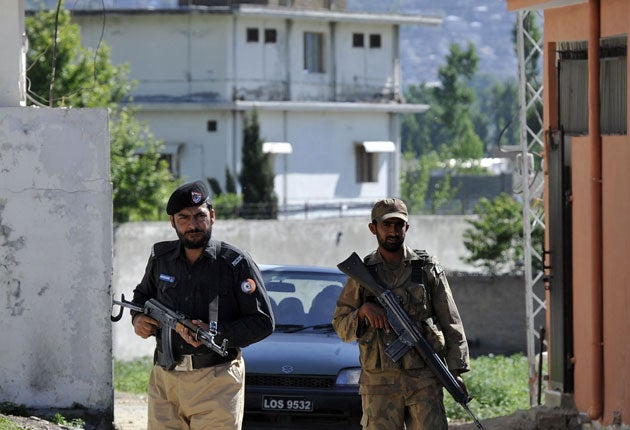Anger and disbelief as Pakistan struggles to reassert sovereignty

In the cool interior of the 190-year-old St Luke's church, a small congregation had gathered to reflect and pray.
"Lord, we ask you to heal the wounds between East and West... we ask you to protect Bin Laden's supporters so they can see what he did," said one worshipper stated, when called upon by the priest to offer a prayer. "We also ask you to protect those here doing their work."
In Pakistan, there is a pressing need for reflection. It is a week since four American helicopters flew low under cover of darkness across the pines and mulberry trees of Abbottabad's Cantonment area, as they and their cargo of Navy Seals made their way to the compound of Osama bin Laden, where the al-Qa'ida leader was unceremoniously shot dead. In the tense days that have followed, Pakistanis have felt shock, surprise, disbelief, indignation and, increasingly, anger.
The anger has shown itself in different ways, much of it directed at the military and civilian authorities as people ask, echoing the words of an American official, whether they are guilty of incompetence or complicity.
Up the hill from St Luke's, in a 120-year-old house located alongside the headquarters of the Baloch Regiment, retired Brigadier Mehmood Jan had already made up his mind.
As a raw recruit to the British 8th Army, the now 87-year-old had fought in North Africa, serving at Tobruk, Benghazi and El Alamein, "going up and down with Rommel". After Partition he had served in Pakistan's wild tribal areas, under General Ayub Khan.
"The Americans are saying we knew he was in Pakistan, we are saying he is not in Pakistan. [Former president] Musharraf even said he was dead," said the old soldier, as his daughter served plum cake and tea in fine china cups.
"Of course they knew. He was there for five years. They had to have servants, buy food, they had a gas connection."
Ordinary people have also been caught up in the aftermath of the killing of Bin Laden. In recent days, dozens have reportedly been arrested or detained by the authorities, accused either of being connected to the al-Qa'ida leader or the US spooks who had him under surveillance.
Among those believed to have been detained is Noor Mohammad, the contractor who built the three-storey house in which the al-Qa'ida leader lived.
For the authorities there is now a struggle to assert Pakistan's sovereignty. So far, they have flailed ineffectively, changing their official line several times.
Today, Prime Minister Yousaf Gilani will go before parliament and repeat the comments of senior military commanders that the authorities will do whatever it takes to protect the nation.
There are reports that the head of Pakistan's Inter-Services Intelligence, Lt-General Ahmad Shuja Pasha, could be the man whose head will roll.
The reality is General Pasha will only stand down if the highest levels of the military, headed by General Ashfaq Kayani, decide there is no alternative.
Undoubtedly, it is something he will be keen to reflect upon.
Join our commenting forum
Join thought-provoking conversations, follow other Independent readers and see their replies
Comments